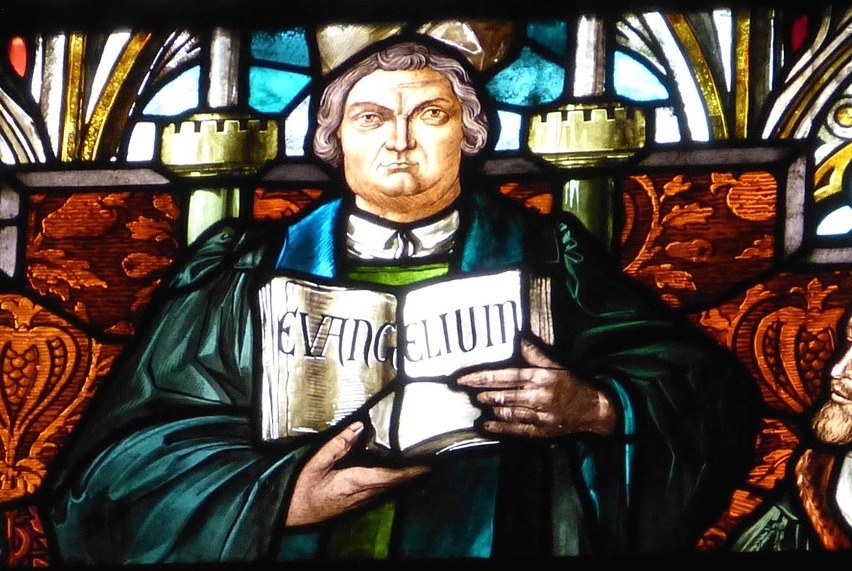The Reformation in Wittenberg, Part II
By Jim West

(We are publishing this essay by Dr. West in three parts over the next few weeks as part of our celebration of the 500th anniversary of the Reformation. It gives us a closer look at how Wittenberg ecountered and dealt with Luther's reforms. Read more about Luther—and Wittenberg—in our issue #115, "Luther Leads the Way." The first post in this series can be found here.)
Luther’s Wittenberg: The Correspondence
While at the Wartburg, Luther wrote to Melanchthon, among other things, these lines which hint at the reception Luther’s reforming efforts were receiving among the populace:
I have not abandoned the hope of returning to you, only God must do what is good in his eyes. If the Pope will take steps against all who think as I do, then Germany will not be without uproar. The faster he undertakes this, the faster he and his followers will perish and I shall return. God is arousing the spirits of many, especially the hearts of the common people. It does not seem to me likely that this affair can be checked with force; if [the Pope] begins to put it down, it will become ten times bigger. Germany has very many Karsthansen.[1]
To Elector Frederick Luther wrote immediately upon his return to Wittenberg from the Wartburg in 1522:
The third reason [for my return]: I am rather afraid (and I worry that unfortunately I may be only too right) that there will be a real rebellion in the German territories, by which God will punish the German nation. For we see that this gospel is excellently received by the common people; but they receive it in a fleshly sense; that is, they know that it is true but do not want to use it correctly. Those who should calm such rebellion only aid it. They attempt to put out the light by force, not realizing that they are only embittering the hearts of men by this and stimulating them to revolt. They behave as if they wanted themselves, or at least their children, destroyed. No doubt God sends this as a punishment.[2]
In 1528, after the Mass had been abolished, Luther observed, in a letter to Spengler, that
Such an innovation may cause quite some commotion among the common people, but this is a risk which must be taken and put into the hands of God. But one must do everything to quiet any such commotion. [3]
Luther’s reforming efforts were a success in that the city of Wittenberg embraced them. The extent to which they made those reformatory impulses their own, however, remains to be seen. It is in Luther’s sermons that we see most clearly how his townsfolk did, or did not, embrace his theology.
Luther’s Wittenberg: The Table Talk
The so called ‘table talk’ are a notoriously uncertain source for reconstructing the ‘historical Luther’. What actually stems from Luther and what is interpretive is monstrously difficult to untangle. Nonetheless it is fair to presume that even if we do not find the ipssisima verba of Luther we still hear his vox clearly enough. And when we hear his voice there we hear things similar to the sermons and the letters concerning the inhabitants of Wittenberg. For instance:
The ingratitude of the world towards the gospel is indescribable and satanic. For the ministers are assailed, here by persecution, there by thanklessness, and unless we had a pious prince to defend us, our own people would torment us more than our open enemies. I could not succeed at present in getting a single city to maintain, by its own aid, a preacher. The whole city of Wittenberg gives in support of the precious gospel, for the entire year, four pfennigs for each person. So it is everywhere. Cities which formerly feasted an unlimited number of monks, are unable now to support a single preacher. And yet papists support monks![4]
Luther’s disgust is on full display in his remarks concerning the frugality of the citizens when it came to actually supporting Protestant/Lutheran clergy.
Luther was also dismayed at the impenetrability of the populace when it came to apprehending the message preached:
It stands with the Christian church just as it does with silly sheep which the wolf has already caught by the wool to devour it. Our nobility, our gentry, citizens, etc. will not hear aright. They think (when we preach the Gospel, and reprove the Papists concerning their confidence in works) that as then we preach of good and easy days, and that they have permission now to live and to do what and how they please.[5]
Silly sheep hearing sermons in such a way that they never really hear what the preacher means; that is the situation of the Wittenbergers. But to be fair to them, it is also the situation of the princes and nobles. Like prince, like people.
[1] Martin Luther, Luther’s Works, Vol. 48: Letters I (ed. Jaroslav Jan Pelikan, Hilton C. Oswald, and Helmut T. Lehmann; vol. 48; Philadelphia: Fortress Press, 1999), 233.
[2] Martin Luther, Luther’s Works, Vol. 48: Letters I (ed. Jaroslav Jan Pelikan, Hilton C. Oswald, and Helmut T. Lehmann; vol. 48; Philadelphia: Fortress Press, 1999), 396.
[3] Martin Luther, Luther’s Works, Vol. 49: Letters II (ed. Jaroslav Jan Pelikan, Hilton C. Oswald, and Helmut T. Lehmann; vol. 49; Philadelphia: Fortress Press, 1999), 208–209.



